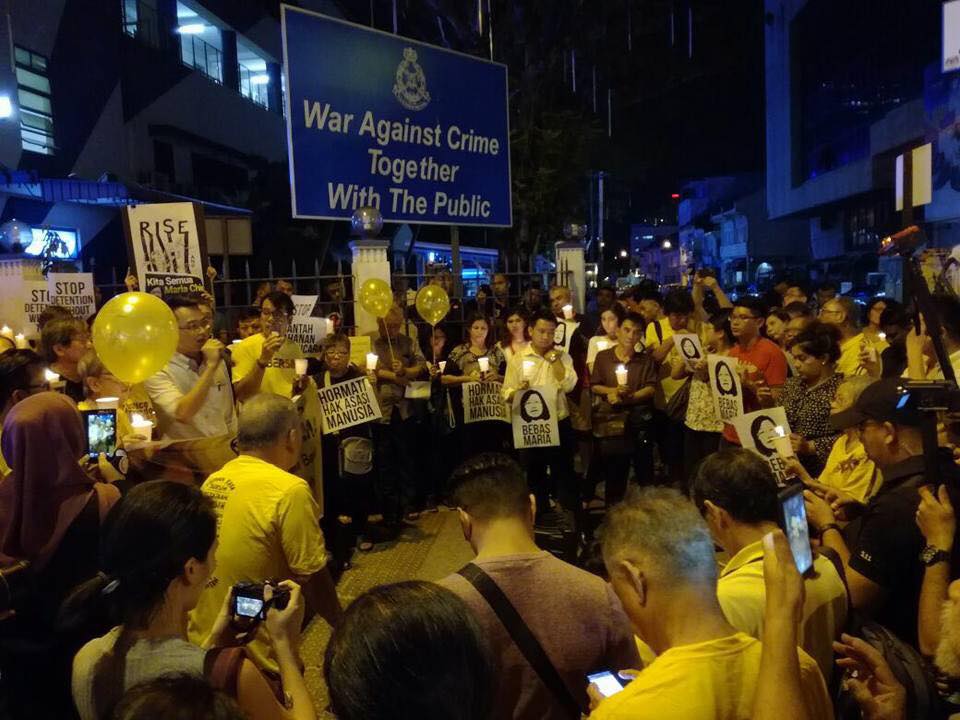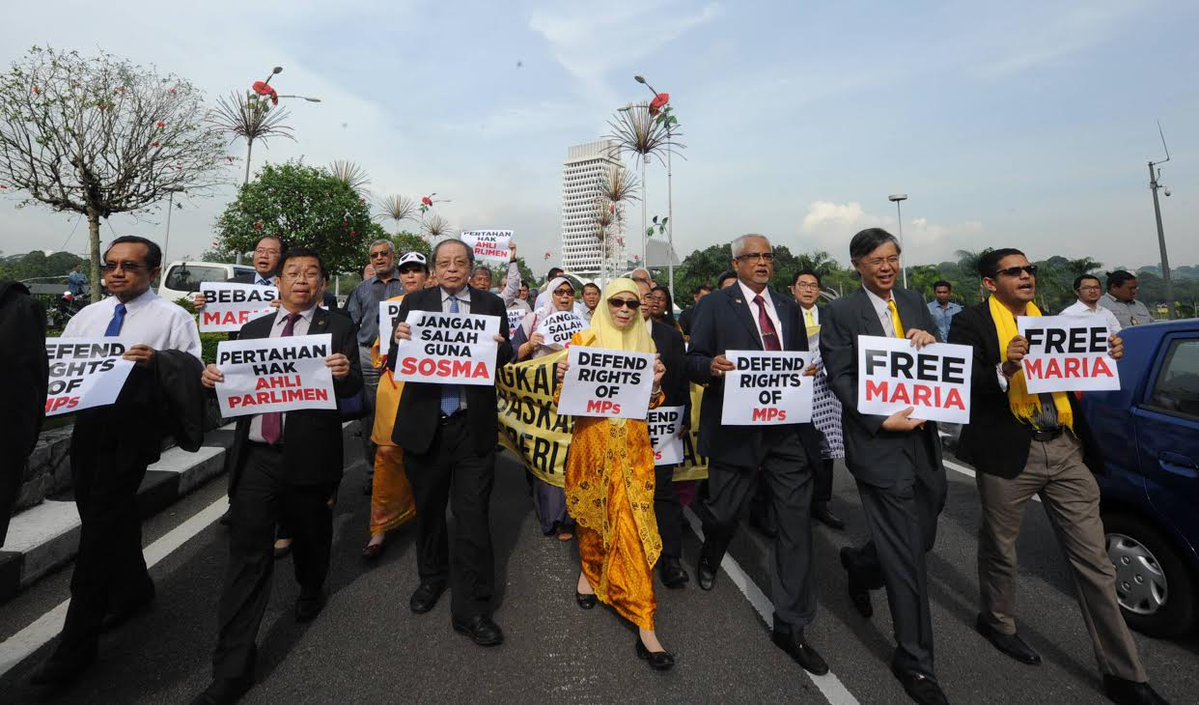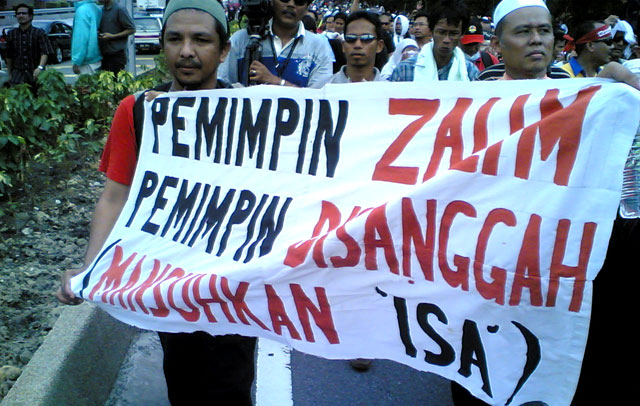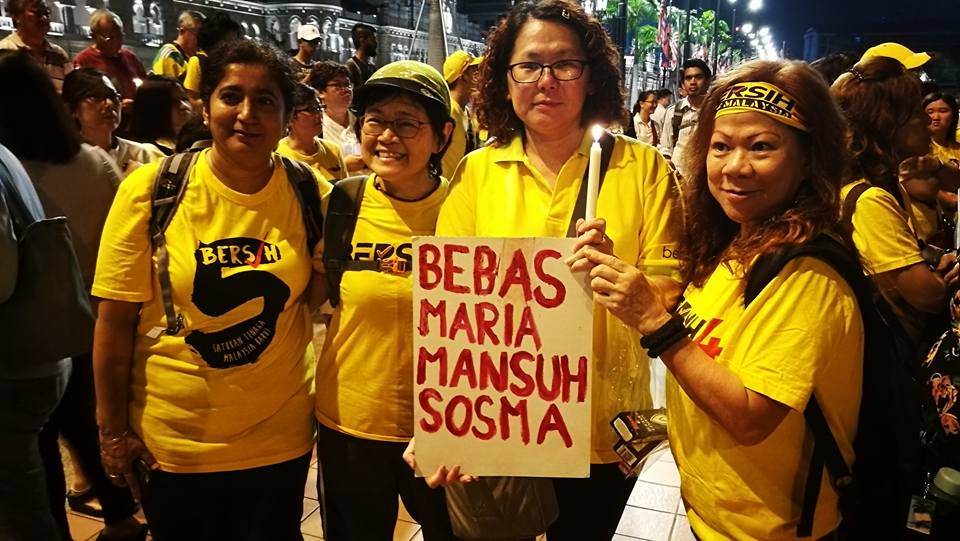Why Do Malaysians Want To Abolish SOSMA? Here Are 8 Facts You Should Know
More than 40,000 people have signed the “#MansuhSOSMA and #BebasMaria" online petition.
There has been much discussion over the Security Offences (Special Measures) Act 2012 (SOSMA) ever since Bersih 2.0 chairman Maria Chin Abdullah was arrested on 18 November, one day before the Bersih 5 rally
A group of supporters attending a candlelight vigil for Maria Chin Abdullah who has been detained.
Image via Bersih 5 快讯It was reported that she has been detained under Section 124C of the Penal Code that criminalises the attempt to commit activities detrimental to parliamentary democracy. The 60-year-old has been detained under the security law for allegedly receiving funds from the controversial Open Society Foundation (OSF).
She is being held in solitary confinement for a total of 28 days without trial, as permitted by the act.
The Bersih steering committee has been organising nightly candlelight vigils over the last few days to demand the release of Maria, as well as the abolishment of SOSMA.
An online petition that kicked off on Monday, 21 November, to #BebasMaria (release Maria) and #MansuhSosma (abolish SOSMA) has also surpassed its 40,000 signatures target within three days.
To help you understand the controversies surrounding Maria's arrest and SOSMA, we simplify the facts below:
1. What is SOSMA?
It was introduced as an anti-terrorism law to maintain public order as well as to address terrorism threats and violent conduct.
This legislation was put in place to replace the equally controversial Internal Security Act (ISA) which was repealed back in 2012.
Under SOSMA, a police officer may, without warrant, arrest and detain any person that is believed to be involved in security offences.
2. What is considered a "security offence"?
SOSMA is a law that provides for special procedures when it comes to persons arrested and the detention people who are being investigated for security reasons. It can be used on people who have breached the list of offences listed under Chapter VI (Offences against the State), VIA (Offences Relating to Terrorism), and VIB (Organized Crime) of the Penal Code.
However, over the years, critics have always argued that the characteristic of "security offences" were too vague and broad.
In 2012, the then Bar Council president Lim Chee Wee said that the definition of “security offences” under Section 3 of the bill is "too broad".
Just two days ago, the Human Rights Commission of Malaysia (SUHAKAM) said that the application of the legislation on Maria demonstrated the "broad characterisation of 'security offences' under SOSMA" which "now suggests that its ambit extends beyond terrorism offences."
3. What happens if someone is arrested under SOSMA?
The police may detain suspects incommunicado for 48 hours. What this simply means is that police can delay family access and legal counsel to the detainees for up to 48 hours after the arrest. The detainees may also be denied bail.
The police may extend the period of detention without trial for up to a maximum of 28 days.
The detainee may be released but an electronic monitoring device will be attached to the person while the police continue their investigations.
When Maria was arrested on 18 November, it was reported that her counsel failed to obtain any access. She was then blindfolded and put in solitary confinement at an undisclosed location.
On 20 November, her family and lawyers were allowed to visit her at the Dang Wangi police headquarters. Seeking her release, Maria’s lawyers have filed habeas corpus, an order to bring a detainee before a judge or court to find out if that person should really be in jail.
4. Is SOSMA the new ISA?
Internal Security Act (ISA) 1971 has often been referred to as a draconian law as it was said to have been abused and used as a political tool to silence opposition party leaders, NGO members and even journalists.
In 2012, the ISA was abolished and SOSMA was enacted to replace the oppressive regime as Prime Minister Datuk Seri Najib Razak has pledged to implement various reforms in federal legislation.
One of the key differences between ISA and SOSMA is that the former allowed initial detention of 60 days with unlimited renewals, whereas the latter allows the detention period for up to 28 days at most.
This was considered to be a major change that guarantees the civil liberties of individuals while dealing with potential threats related to terrorism.
5. If it's supposedly a "better" law, why are Malaysians worried?
Section 4(3) of SOSMA states that "no person shall be arrested and detained under this section purely for his political belief or political activity".
Tan Sri Abdul Gani Patail, who was the Attorney General when SOSMA was passed in Parliament, has also repeatedly stressed that SOSMA was not "intended to guillotine parliamentary democracy or suppress political freedom".
However, the circumstances surrounding Maria's arrest and detention has once again triggered talks that SOSMA is being abused to silence dissenters, just like the ISA.
"The application of the SOSMA to Maria Chin where she has been detained without charge and without trial in this instance, and her wellbeing and welfare unknown, cannot be accepted by a society that has a national conscience," chairman of the Human Rights Commission of Malaysia (SUHAKAM) Tan Sri Razali Ismail said.
6. Why does Malaysia need SOSMA?
Back in 2012, Datuk Seri Nazri Aziz told The Star that SOSMA, which allows 28 days of detentions, was a crucial measure to ensure that the police have sufficient time for continuity in the investigation and to gather enough evidence since they are dealing with "security offences and not ordinary criminal offences".
It is also noted that there are similar terrorism legislations in other countries which allow detention without pressing charges such as UK's Prevention of Terrorism Acts, US’s Patriot Act and Singapore's Internal Security Act (ISA).
7. Why is SOSMA only under public scrutiny now?
SOSMA has always been a subject of controversy, even before it was enacted. The bill was highly debated on many different occasions over the years.
Last year, SOSMA was highly criticised after it was used to detain 1Malaysia Development Berhad critic Datuk Seri Khairuddin Abu Hassan and his lawyer Matthias Chang.
The incident was viewed as a "blatant abuse of SOSMA" for political reasons by those who opposed the legislation as the government had made promises that it will never be used to silence political dissenters and the inclusion of legal safeguard.
8. Is it even possible to abolish SOSMA?
It was reported that Lawyers for Liberty’s Melissa Sasidaran has said that SOSMA, like its predecessor, can be repealed in the Parliament.
According to her, lawmakers will need to file a motion at the Dewan Rakyat, and have it debated and voted on.
Those who oppose SOSMA will need to pressure and lobby against the bill, just like what they did in order to get the ISA abolished.
Meanwhile, Maria's son, Azumin Mohamad Yunus, said that it was "unfair" that his mother is being branded as a terrorist



